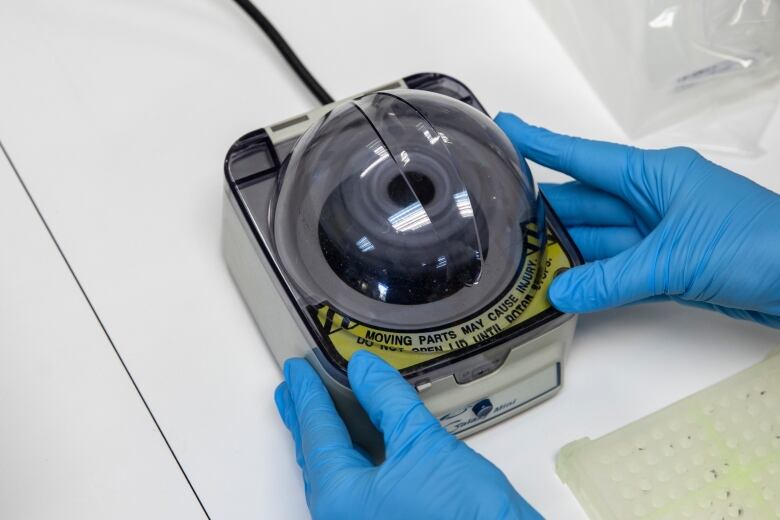Here's why some scientists want to change how we talk about monkeypox
Experts say strains of disease should be described with less discriminatory, stigmatizing language
The World Health Organization supports coming up for a new name for monkeypoxamid a call from a group of scientists to use less discriminatory terminology to describethe infections popping up in more and more places around the globe.
Scientists calling for a shift in how we talk about the viruspoint toitsclades or strains having pre-existing names relating toAfrican regions (West African and Congo Basin), which are bothstigmatizing and inaccurate in reflectingthe nature of the current spreadof the virus.
WHO Director-General Tedros Adhanom Ghebreyesus said this weekthat the UN healthorganizationis "working with partners and experts from around the world on changing the name of monkeypox virus, its clades and the disease it causes."
The scientistsbelieve changinghow we communicate about the disease would promote more sharing of knowledge about outbreaks and could help minimize negative impacts.
Emma Hodcroft, a molecular epidemiologist andpost-doctoral fellow at the University of Bern's Institute of Social and Preventive Medicine, is among the scientists calling for changes in how the clades are described.

"The main harm here is for African people, who are stigmatized by the associationthat monkeypox is endemic in humans in the regions where the old clades are named after," Hodcroft told CBC News in anemail.
Hodcroft and the other scientists pointed to media reports that have used stock images of African monkeypox patientsas part of coverage of the outbreak occurring in Europe as "an obvious manifestation" of this stigmatization.
Thescientists areproposing that the clades be named numerically in their order of discovery for example, MPXV 1, MPXV 2 orMPXV 3 rather than with a geographic identifier.
Not like prior outbreaks
Well over1,000monkeypoxcases have been confirmed so far in awidening outbreak that has seen the virus detected in more than two dozen countries including in Canada where ithas not been endemic to date.
But that's just one way the current outbreak differs from previous ones.
The scientists advocating for the change in clade names point out that the virus is currently spreading from human to humanand not via spillover events from animals to humans, as it typically has in the past.
That rings true for Stephen Hoption Cann, a clinical professor at the University of British Columbia's School of Population and Public Health.
"This is completely different in how it's spreading," he told CBC News in an interview, noting prior spread ofthe virus has been much more limitedgeographically.
Separate from the consideration of the future name of the virus, WHO is set to meet next week to assess whether the current outbreak represents a public health emergency of international concern.
Where does the current name come from?
According to WHO, the monkeypox virus was first discovered inlaboratory monkeys hence the name in a Copenhagen research facility in 1958.Human monkeypox was first identified12 years later.
WHO told CBC News that the name for human monkeypox was assigned before the currentbest practices for naming diseaseexisted.
Under these naming practices, WHO said the aim is to "minimize unnecessary negative impact"on people, places and cultures, among other considerations.
Rosamund Lewis, WHO's technical lead for monkeypox, said the process of renaming of the disease"may not be asstraightforward" as it would be for a disease that the world is otherwise unfamiliar with.
"It's a disease that has been commented on, published on for, well, 50 years now or more," Lewis told CBC News Network in an interview on Friday.
Heidi Tworek, an associate professor in international history and public policy at the University of British Columbia, believes a renaming push could proceed smoothly, particularly after WHO's efforts innaming various COVID variants.
"The WHO's success in renaming COVID variants from place-based into the Greek alphabet shows that it is possible to change how journalists write about a disease," Tworek told CBC News in an email.
The precise timeline for anyrenaming of the monkeypox virus is unclear.
According to WHO,"the naming of viruses is the responsibility of the International Committee on the Taxonomy of Viruses."They said theprocess to rename the wider group of orthopox virus species which includes both smallpox and monkeypox is already underway.
In terms of changing the names ofmonkeypox clades, which is what the group of scientists are formally calling for, WHO says it is consulting "with experts and technical advisory groups in poxvirology and viral evolution."
Hodcroft, themolecular epidemiologist, said the existing naming method may have seemed "reasonable" at one time, but it isn't now.
"We now know these aren't even very useful geographical descriptions cases can be found outside of these areas, and not all places within these areas have cases," she said.
"What they do leave behind however, is stigma attached to the fear of monkeypox and who may be 'to blame.' "














_(720p).jpg)


 OFFICIAL HD MUSIC VIDEO.jpg)
.jpg)



























































































